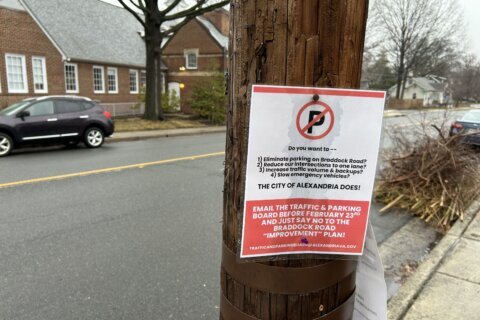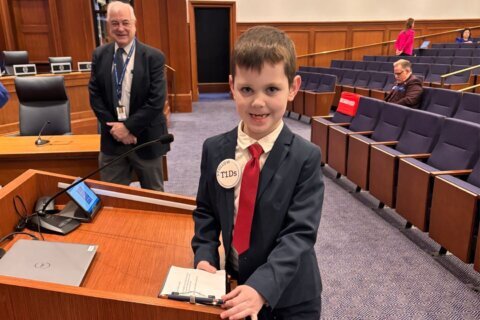This article was republished with permission from WTOP’s news partner InsideNoVa.com. Sign up for InsideNoVa.com’s free email subscription today.
This article was written by WTOP’s news partner, InsideNoVa.com, and republished with permission. Sign up for InsideNoVa.com’s free email subscription today.
A new report is underscoring the increase in Northern Virginia families struggling to afford basic needs.
In 2021, 20% of families in the region did not earn enough money for shelter, food, medical care and other essentials. Another 9% could not afford child care in addition to these needs.
The report comes from the Community Foundation of Northern Virginia’s research arm, Insight Region. It says recent inflation has pushed many families into what is called income inadequacy.
According to the U.S. Bureau of Labor Statistics, from December 2020 to December 2021, gasoline prices rose nearly 50%, food prices rose more than 6% and rent rose over 3%. A year and a half later, families are still feeling the effects of inflation despite its recent cooling.
“In the first half of 2023, a third of families in Northern Virginia reported difficulty paying the bills,” the report states.
Moderate and middle-income families — historically cushioned from income inadequacy — saw the highest increase in families struggling. The percent of families earning between $100,000 and $150,000 struggling to pay their bills increased from 15% in 2021 to 34% in 2023, according to the report.
Families whose primary earners did not have a bachelor’s degree, identified as Black or Hispanic, and whose primary job was in food service, construction, personal care and grounds/building work saw higher rates of income inadequacy.
The report states that needs tended to cluster, with more than 30% of families in Alexandria, south Arlington, Manassas, Manassas Park, Falls Church, and the Annandale-Bailey’s Crossroads area of Fairfax County unable to cover basic needs.
To deal with rising costs, the report says families at all income levels are changing their habits. Many are cutting back on discretionary spending, like dining out less frequently, switching to generic brands and looking for sales when they shop.
However, one in every five families has sacrificed more serious essentials such as medical care or food to make ends meet. About half of families have also compromised their financial health.
“Low and moderate-income families were the most likely to make changes overall in response to inflation, and also had exceptionally high rates of sacrificing a basic need (42%) to cope with rising costs,” the report reads.
For single-parent families and households with only one working parent, “getting by” in Northern Virginia can come with different financial considerations and sacrifices.
About half of families with children in Northern Virginia are headed by two working adults, and most families in Northern Virginia depend on two incomes.
The report says if each family with 2+ workers only had its primary (highest paid) source of income, 45% of the region’s families would not have enough income to pay for basic needs, and 67% would struggle with the cost of child care.
The struggle of single mothers
Chanel and Crissy are single mothers living in Prince William County. They have well-paying jobs but struggle to keep up with basic expenses like utilities, gas, and food. Both women also say housing is the most difficult — yet most essential — expense to cover.
Crissy, 35, who did not want to share her last name, said she can afford only to pay her rent and partly fill up her gas tank. She has five children, lives paycheck to paycheck and receives help from different organizations to cover her utility expenses.
She has lived in her Prince William home with her children for 10 years. She previously shared the expenses with her boyfriend but was left to cover her bills alone after they split in 2021.
Her rent was $1,000 a month when she first moved into the home, but it has since increased to $1,600. She has tried to find more affordable housing but without success.
While trying to keep up with current expenses, Crissy says she’s not able to plan for the future. Her landlord offered to sell her the house she rents for $350,000, but she declined, knowing she could not get a loan.
She has worked at her retail job for 12 years and only recently started putting money in a 401(k). “I’m only able to worry about today and this month and this year. I’m not able to worry about my retirement — I can’t afford it.”
Making difficult choices
Chanel, who asked only to be identified by her middle name, has four children and says feeding her children sometimes means not eating herself.
“I just bought a couple of items — small items, and it cost me $50,” Chanel said. “That’s hard because once the food is gone, once you’ve cooked all the food or eaten all the food, then you gotta go back and get more.”
Despite having a roof over her head, Chanel says she considers herself homeless because she is “bunking from home to home.” She moved in with loved ones after the lease on her previous home ended and the owners sold the house.
When she had her own house, all her income went toward rent. “A three-bedroom would have been $1,500 to $1,700 [monthly rent],” she said. “Now, they’re $2,400 to $2,500, and that’s not affordable.”
The report says addressing income inadequacy in the wake of inflation requires tackling immediate and long-term challenges for struggling families.
Some immediate solutions put forth in the report include expanding program eligibility to families at higher income levels and further developing outreach and technology to connect eligible families with assistance.
Long-term solutions include expanding homeownership programs for lower-moderate-income families and supporting low-interest loans to low and moderate-income families.
This article was prepared in cooperation with the Community Foundation for Northern Virginia.







